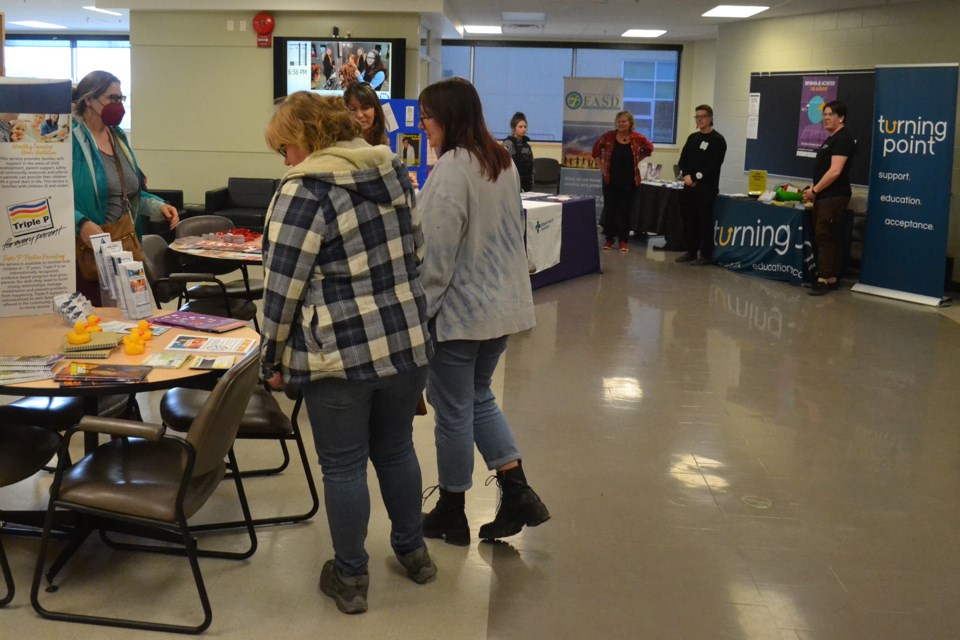OLDS — Kids are kids – they're going to experiment and make mistakes from time to time. But there are things parents or guardians can to help them avoid pitfalls like using drugs or other substances, or assisting them if they do so.
That, in essence, was the message that Christine Laval, a health promotion facilitator with Alberta Health Services gave during a presentation entitled Kids & Drugs: A Parent’s Guide To Prevention, held April 28 at École Olds High School. The two-part event was organized by the Olds & Area Substance Use Coalition.
At about 6:10 p.m., she gave an approximately 45-minute talk on what to watch out for if you suspect your child may be using drugs or thinking of doing so.
At about 7 p.m. the approximately 20 attendees were invited to peruse a mini resource fair showcasing resources parents or guardians could access if necessary.
It was noted that drugs or substances of concern range from extremely addictive and dangerous ones like fentanyl and heroin to cannabis, alcohol and even high amounts of caffeine in some drinks.
Laval said kids may be offered drugs from peers. They may be open to that idea because they feel like they “don’t fit in” at school but the users they encounter make them feel appreciated and part of a group.
Laval noted kids – especially teenagers – can go through some pretty stressful times as their bodies change and that could make them open to experimenting with substances.
Another problem is that substance use and/or alcohol use may be normalized at home. Kids may see their parents use substances or abuse alcohol so they think it’s OK for them to do so.
Parents or guardians who use substances or drink to excess, then in essence say to their kids, ‘do as I say, not as I do,’ also make it confusing and difficult for parents or guardians to persuade kids from following suit.
“Oftentimes we would do activities with kids and we would have them pour just what they thought would be a standard serving of a drink," Laval said.
“On average, kids – and some would say young adults, probably some adults – would pour themselves, overserve themselves, by seven to 20 times more in that one drink.”
Yet another problem, she said, is in some families, “nobody has really taken that time to really educate them or show them just how to reduce some of those harms around their potential use.”
Laval advised parents or guardians to talk to their kids – not lecture them, but talk to them in an age-appropriate way. A good way to do that is to talk with them while participating together on some task or activity.
Open up communication by asking them how their day went. Engage with them about their friends, she suggested.
A good way to help them to stay – or get – on a safe path is to encourage them to get involved with school and extra-curricular activities that interest them, that they enjoy, Laval said.
“Lots of times kiddos, especially teenagers, will get stuck in that rut of ‘well, I can’t do that,’ ‘I’m not good at that,’ ‘I don’t want to do that’ or ‘that’s scary,’” Laval said.
"We want to find things that they enjoy doing, that help them feel like they’re positive, they’re capable, they’re worthy.”
If kids are wondering about drugs, Laval recommended doing some research with them to ensure they have well-rounded information.
Above all, Laval said, be honest and look at the situation from your child’s perspective.
“We all as teenagers probably made some poor choices and some stuff we wouldn’t do again. And so know that that’s going to happen (with your children as well),” Laval said.
“After tonight, you guys’ job is to just parent, right? You’re not the probation officer, the jailer, the addiction counsellor, the therapist," she added.
“You can create that safe space for them and know that we can get them connected to the appropriate resources, which is why we have the mini resource fair right after this.”



